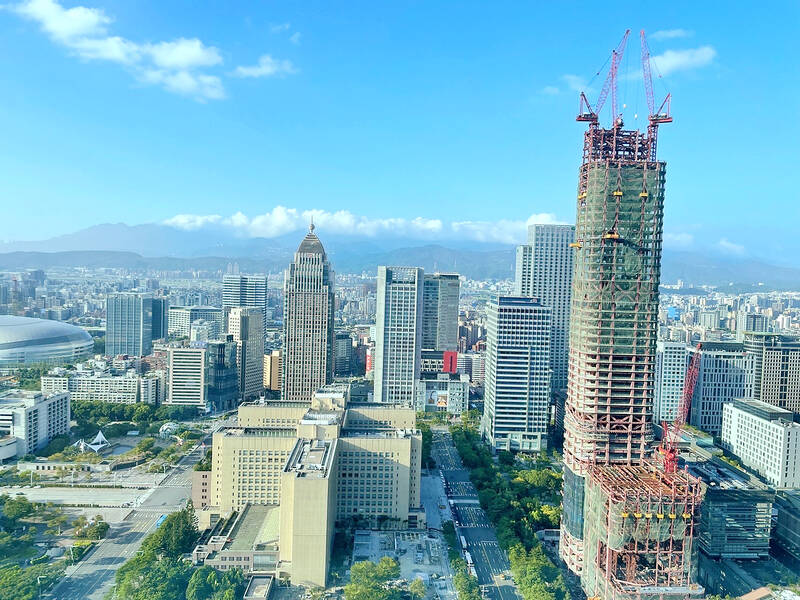Average monthly rent for Grade-A offices in Taipei last quarter climbed 3.6 percent year-on-year to a record high of NT$3,052 per ping (3.3m2), property consultancy Jones Lang LaSalle (JLL) Taiwan said on Tuesday.
It is the first time that the average rent for Grade A offices has been above NT$3,000 per ping, driven mainly by self-occupancy, upgrades and relocation needs from companies in the technology, financial and pharmaceutical sectors, JLL Taiwan said in a report.
On a quarterly basis, average rent rose 2.2 percent, the report said.

Photo: Hsu Yi-ping, Taipei Times
Rent for offices in the city’s prime Xinyi District (信義) increased 4.8 percent year-on-year to an average of NT$4,088 per ping — also a new high — with the average cost of premier floors standing firm at NT$5,000 per ping, JLL Taiwan said.
The vacancy rate for Grade A offices in Taipei last quarter grew 2.33 percentage points from a year earlier and 1.63 percentage points from the previous quarter to 4.3 percent, the report showed.
An addition of almost 30,000 ping of new office space accounted for the increase in the third-quarter vacancy rate, the report said, adding that the uptick was temporary in nature, as new office leasing totaled 14,000 ping and the increase in rent outpaced the vacancy rate’s growth.
“Landlords still have the upper hand,” JLL Taiwan said.
Rent is expected to continue rising in the near future, but might mitigate in 2027 when 222,000 ping of new office space would be added to the market in Nangang District (南港) and other core business areas, with 65.3 percent of it available for leasing, JLL Taiwan managing director Kevin Hou (侯文信) said.
Increasing demand for green architecture would also put pressure on landlords to comply and help reduce carbon emissions, Hou said, adding that JLL Taiwan created a task force earlier this year to help clients obtain green licenses.

UNCERTAINTY: Innolux activated a stringent supply chain management mechanism, as it did during the COVID-19 pandemic, to ensure optimal inventory levels for customers Flat-panel display makers AUO Corp (友達) and Innolux Corp (群創) yesterday said that about 12 to 20 percent of their display business is at risk of potential US tariffs and that they would relocate production or shipment destinations to mitigate the levies’ effects. US tariffs would have a direct impact of US$200 million on AUO’s revenue, company chairman Paul Peng (彭雙浪) told reporters on the sidelines of the Touch Taiwan trade show in Taipei yesterday. That would make up about 12 percent of the company’s overall revenue. To cope with the tariff uncertainty, AUO plans to allocate its production to manufacturing facilities in

TAKING STOCK: A Taiwanese cookware firm in Vietnam urged customers to assess inventory or place orders early so shipments can reach the US while tariffs are paused Taiwanese businesses in Vietnam are exploring alternatives after the White House imposed a 46 percent import duty on Vietnamese goods, following US President Donald Trump’s announcement of “reciprocal” tariffs on the US’ trading partners. Lo Shih-liang (羅世良), chairman of Brico Industry Co (裕茂工業), a Taiwanese company that manufactures cast iron cookware and stove components in Vietnam, said that more than 40 percent of his business was tied to the US market, describing the constant US policy shifts as an emotional roller coaster. “I work during the day and stay up all night watching the news. I’ve been following US news until 3am

Taiwan will prioritize the development of silicon photonics by taking advantage of its strength in the semiconductor industry to build another shield to protect the local economy, National Development Council (NDC) Minister Paul Liu (劉鏡清) said yesterday. Speaking at a meeting of the legislature’s Economics Committee, Liu said Taiwan already has the artificial intelligence (AI) industry as a shield, after the semiconductor industry, to safeguard the country, and is looking at new unique fields to build more economic shields. While Taiwan will further strengthen its existing shields, over the longer term, the country is determined to focus on such potential segments as

COLLABORATION: Given Taiwan’s key position in global supply chains, the US firm is discussing strategies with local partners and clients to deal with global uncertainties Advanced Micro Devices Inc (AMD) yesterday said it is meeting with local ecosystem partners, including Taiwan Semiconductor Manufacturing Co (TSMC, 台積電), to discuss strategies, including long-term manufacturing, to navigate uncertainties such as US tariffs, as Taiwan occupies an important position in global supply chains. AMD chief executive officer Lisa Su (蘇姿丰) told reporters that Taiwan is an important part of the chip designer’s ecosystem and she is discussing with partners and customers in Taiwan to forge strong collaborations on different areas during this critical period. AMD has just become the first artificial-intelligence (AI) server chip customer of TSMC to utilize its advanced